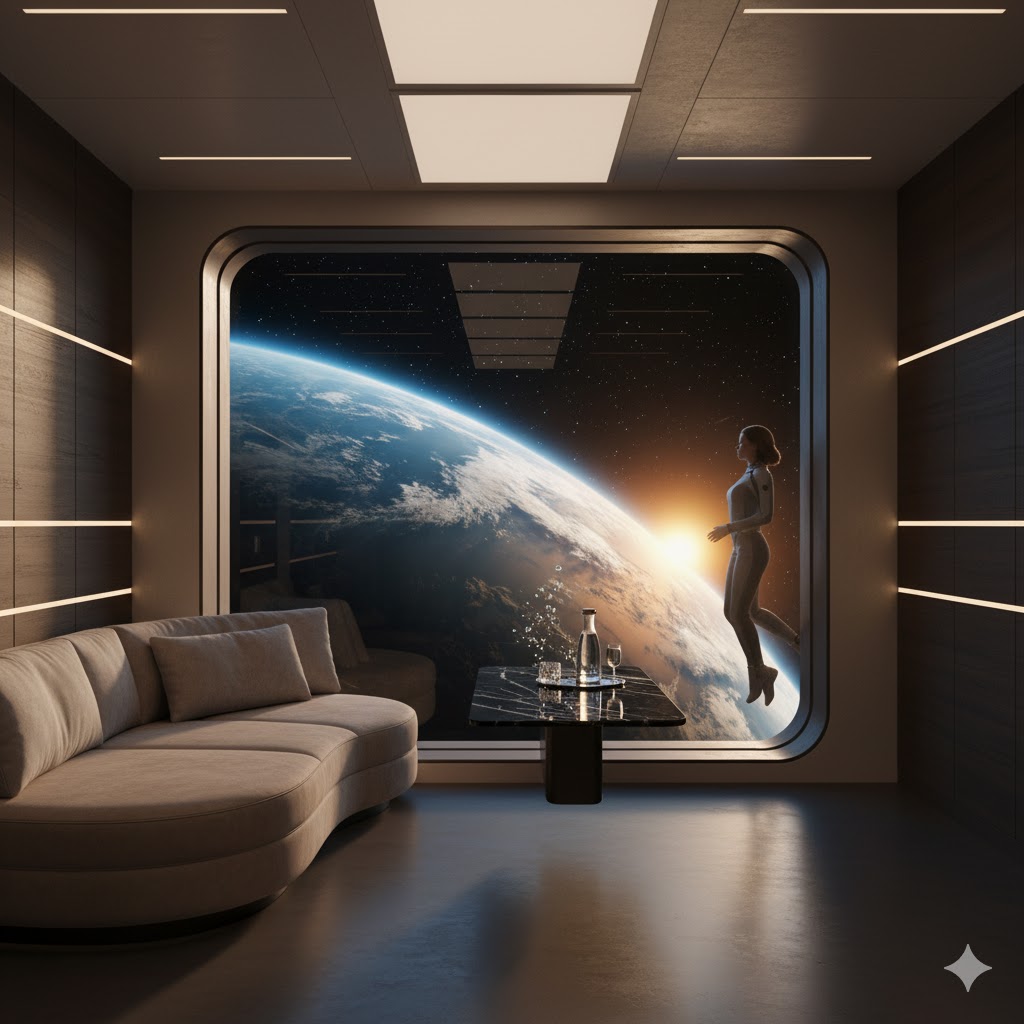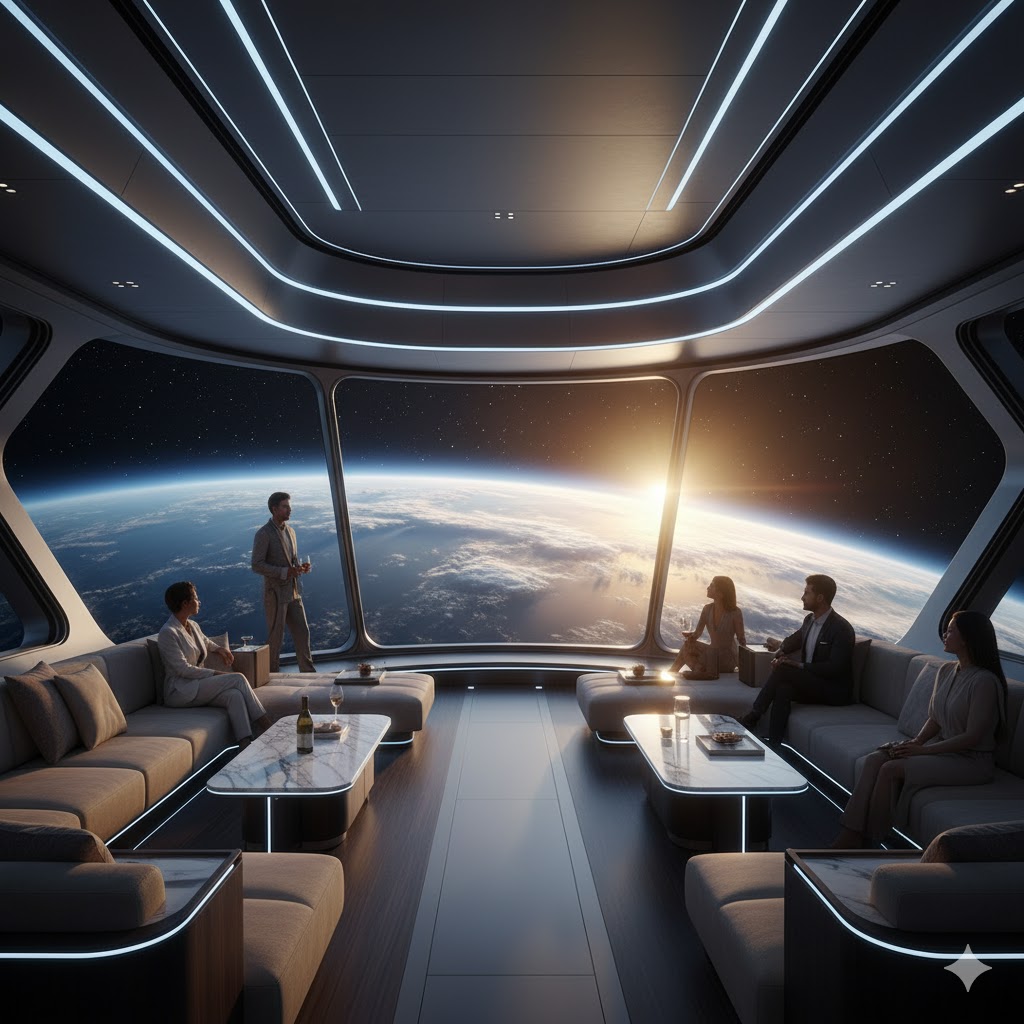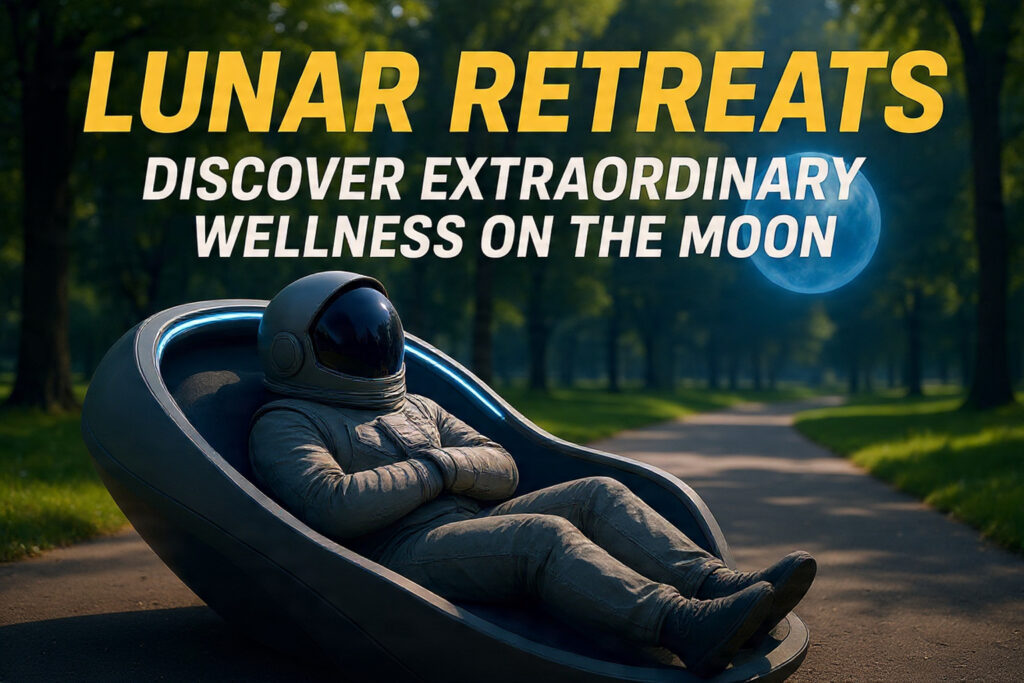Introduction: When Luxury Meets the Cosmos
Once, the height of luxury travel was crossing oceans aboard grand liners like the Titanic or Queen Mary.
Now, the next chapter begins far above the clouds — aboard cosmic cruises, where the horizon curves into infinity and stars shimmer like jewels.
Imagine sipping champagne in zero gravity, floating past auroras from orbit, or gazing down on Earth from your private suite.
This isn’t fantasy anymore — space tourism giants like SpaceX, Orbital Assembly, and Blue Origin are designing the world’s first space cruise liners, launching in the 2030s.
The Birth of the Orbital Cruise Era
The concept of cosmic cruising merges the comfort of a 5-star resort with the adventure of interplanetary exploration.
According to Orbital Assembly Corporation, the first Voyager Station (a rotating hotel) is expected to host 400 guests by 2035.

These structures will simulate partial gravity through rotation, offering amenities like:
- 🛏 Zero-Gravity Suites — with panoramic Earth views.
- 🍽 Space Gastronomy Labs — where chefs prepare cosmic menus using hydroponic ingredients.
- 🧘♀️ Orbit Wellness Spas — radiation-safe domes for low-gravity massages and oxygen therapies.
- 🛰 Observation Lounges — for real-time celestial events: eclipses, meteor showers, and aurora storms.
Source:
🔗 Orbital Assembly Corporation — Voyager Station Project
Inside the World’s First Space Cruise Ship
Step aboard a cosmic cruiser — a fusion of technology, sustainability, and surreal beauty:
| Deck | Feature | Description |
|---|---|---|
| A-Deck | Gravity Lounges | Rotating rings for comfortable movement & dining |
| B-Deck | Sky Pool | Sealed dome with magnetic fluid that behaves like water in zero gravity |
| C-Deck | Astro-Theatre | Transparent ceiling for galactic night shows |
| D-Deck | Wellness Pods | Meditation in total silence, guided by AI companions |
| E-Deck | Celestial Suites | Private cabins with AR-enhanced windows projecting planets & stars |
Guests will travel in rotational orbit around Earth, lasting 72 to 120 hours per cruise, experiencing 16 sunrises and sunsets daily.

The Cost of Orbiting in Luxury
Initially, ticket prices for cosmic cruises could reach $250,000–$500,000 per person, similar to early suborbital flights.
However, with reusable rockets and private funding, experts predict commercial affordability by 2035, bringing down the cost to under $50,000.
“Luxury will no longer mean exclusivity — it will mean elevation,”
says Dr. Anita Verma, Aerospace Economist at Space Tourism Forum 2025.

The Experience: Life Among the Stars
A cosmic cruise is not just a trip — it’s a complete redefinition of sensory experience:
- Dining: Chefs prepare molecular cuisine designed to behave in microgravity.
- Recreation: Holo-simulators recreate Earth’s beaches or forests for relaxation.
- Connection: Guests send “space postcards” — live video greetings transmitted from orbit.
- Entertainment: AR dance shows projected on the ship’s glass walls.
Must Visit: Lunar Retreats: The Future of Wellness on the Moon

The Sustainability Challenge
Running a luxury cruise in orbit demands innovation:
- Recycled Air & Water Systems
- Solar-Powered Propulsion
- Waste-to-Energy Reactors
- Hydroponic Food Gardens
Companies like Axiom Space are developing eco-regenerative modules to keep cosmic travel carbon-neutral.
Source 2:
Axiom Space — Sustainable Space Habitats
Why Cosmic Cruises Could Go Viral
In the social media era, the “space selfie economy” is real.
The first influencer aboard a cosmic cruise will likely break every view record — imagine posting a vlog titled “Dinner Above Earth.”
And because content creation, affiliate partnerships, and VR travel access are integrated, cosmic cruises could dominate the luxury influencer and experiential travel markets.
FAQs — Cosmic Cruises 2026 & Beyond
Q1: When will space cruises be available for civilians?
A: Early short-term orbital experiences are projected to begin around 2030–2035 for private travelers.
Q2: How long will a typical space cruise last?
A: Between 3 to 10 days, depending on orbit altitude and vessel type.
Q3: Is space motion sickness common?
A: Most travelers experience mild disorientation for 24 hours; AI-assisted stabilizers will minimize effects.
Q4: Can I book now?
A: Several companies, including Space Perspective and SpaceX, have waiting lists for suborbital and orbital flight programs.
Traveler Advice: The Voyage That Changes Perspective
Cosmic Cruises represent the next golden age of exploration — one not over oceans, but across orbits.
It’s where luxury meets infinity, and travelers rediscover wonder through the cosmic lens.
If Earthly luxury once meant opulence, future luxury will mean transcendence.




Pingback: Mars Eco Lodges: Discover 1 Sustainable Living on Red Planet
Pingback: Galactic Cruises: Luxury Voyages Across the Stars 2026 Vision